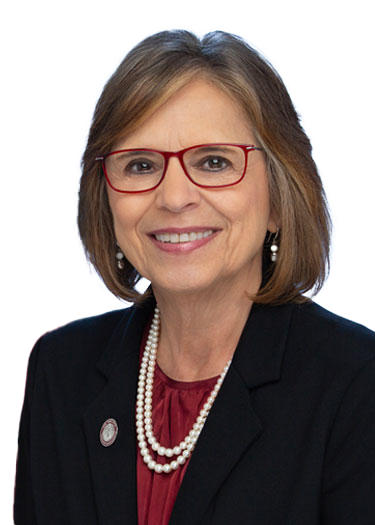Lupardo Bill Could Help Counties Fund New DWI Laws
Legislation supported by Broome County Executive, District Attorney, STOP-DWI program and New York State Association of Counties
Assemblywoman Donna Lupardo (D-Endwell) was joined by Broome County District Attorney Gerald Mollen and Broome County STOP-DWI coordinator James May at a press conference today to urge the state legislature to pass a bill she recently introduced (A.11374-A) to help counties pay for the implementation of Leandra's Law. The bill would redirect $6.8M in surcharge money from the state General Fund to the STOP-DWI Programs across New York.
Leandra's Law (Ch. 496 of 2009) mandates stricter penalties for driving drunk while transporting children under age 16. The law is named after 11-year-old Leandra Rosado of the Bronx, who died last year in a car crash on the way to a slumber party.
Counties are concerned with an unfunded provision of the law that requires all drivers convicted of misdemeanor or felony driving while intoxicated (DWI) to have ignition interlocks – devices that drivers breathe into to determine their blood-alcohol content (BAC) – installed on their cars. This provision will take effect on August 15, 2010. At least 25 counties have already asked for a two-year moratorium on the ignition interlocks until a funding stream has been established.
Each interlock sentence involves confirmation that the device was installed and that one was installed on every vehicle owned or operated by the driver. Once it is on, the data from the machine must also be monitored – in some cases it will be our probation officers, and in other cases the county will be held responsible for monitoring the data of offenders. All of this must be coordinated with Department of Motor Vehicles (DMV), the Drinking Driver Program or treatment agencies, the interlock provider, the district attorney and the court.
The proposed legislation would redirect $6.8 million in DWI surcharges already collected in the General Fund to the local STOP-DWI. Instead of forcing counties to develop an entirely new – and unfunded – process, her bill utilizes the county STOP-DWI program and its existing statutory funding mechanism to fully implement the ignition interlock program. In addition, it establishes a recurring revenue stream to provide the necessary funding to maintain the program going forward.
“The implementation of Leandra's Law has become a burdensome unfunded mandate for the Counties – that's why 25 have already asked for a two year moratorium to allow a funding stream to be made available,” said Lupardo, a member of the Transportation Committee in the Assembly. “By using an existing funding stream, derived from convicted drunk drivers, and by utilizing the expertise and core competency of the county STOP-DWI Coordinators, we can implement the expanded ignition interlock program effectively and on time.”
“The newly enacted ignition interlock requirement for convicted DWI offenders can save lives – if properly funded and properly implemented,” said Broome County District Attorney Gerald Mollen. “If unfunded or merely added to an already overburdened and under-funded criminal justice system, with little or no additional fiscal support, the law will merely serve as a press release for Albany officials. The bill proposed by Assemblywoman Donna Lupardo will ensure that this important legislation is properly funded – so that it can be properly implemented and actually save lives.”
"I want to compliment Assemblywoman Donna Lupardo for her leadership in traffic safety and for her efforts to help counties implement Leandra's Law,” said James F. May, Broome County STOP-DWI Coordinator. “Donna Lupardo has found the one and only solution to make Leandra's Law not only work, but be a success. Passage of this bill will provide critical funding to counties to help make their roadways safer from drunk drivers."
Lupardo’s bill is in the Transportation Committee in the Assembly. Senator Martin Malavé Dilan (D-Brooklyn) is sponsoring an identical bill (S.7951) in the Senate, where it is currently in the Codes Committee.
The following statements were provided in support of the legislation:
“It’s important that local DWI Coordinators have the resources to combat unlawful and reckless practices, such as driving drunk with children in the car. That’s why we passed, and the Governor signed, Leandra’s Law. However, we can’t leave counties on their own to enforce the law at their own cost. This legislation assures localities have the resources to enforce every provision of Leandra’s Law, which has proved to be instrumental in the fight against drunk driving,” said Senator Martin Malavé Dilan (D-Brooklyn), Chair of the Senate Transportation Committee and the sponsor of the bill in the Senate.
"Removing drunk drivers is our top priority. Too many tragedies have occurred on our roadways and government must do all it can to prevent this behavior on our roadways," said New York State Association of Counties (NYSAC) President Tom Santulli, the Chemung County Executive. "This ignition interlock program and child protection act is the most important anti-DWI program in decades. Unfortunately, when the law was passed, the state provided no funding. This is wrong and we applaud state legislative efforts to dedicate funding to effectively implement this important safety law."
“Any relief we can get form this state mandated program will be welcome,” said Broome County Executive Barbara Fiala. “The intent of Leandra’s Law is admirable and we certainly support keeping drunk drivers off of our roads. However, the methods imposed by this legislation are costly and time consuming for all counties and I applaud Assemblywoman Lupardo for recognizing this fact and for taking it upon herself to recommend a workable solution.”
“I am very happy that New York State will now require these (ignition interlocking) devices to help keep drunk drivers off of the road,” said Broome County Legislator Rick Materese (D-District 14), Chairman of the Public Safety and Emergency Services Committee. “I am very thankful that Assemblywoman Lupardo is trying to make this latest mandate easier to swallow by providing funding to counties for compliance and monitoring.”
